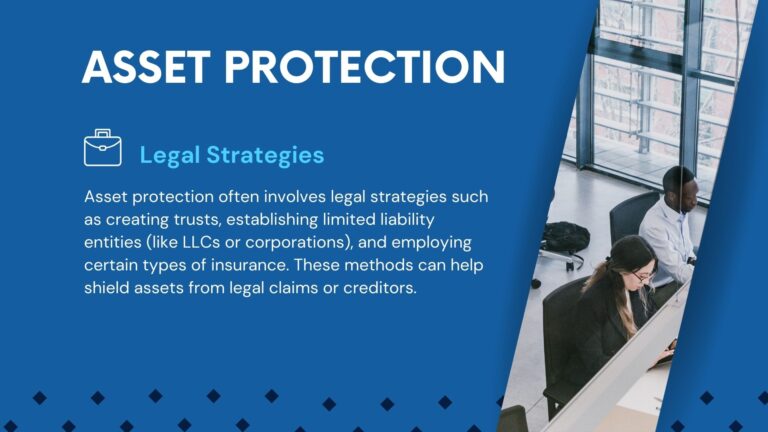Asset protection strategies are designed to shield assets from legal claims or creditors by employing various legal and financial tools to make it difficult for creditors to access those assets.
Here’s how asset protection works
- Legal Structures: Setting up entities like Limited Liability Companies (LLCs) or corporations can protect personal assets from business liabilities. For example, if you own a rental property through an LLC, creditors can generally only pursue the assets of the LLC, not your personal assets.
- Trusts: Placing assets into certain types of trusts (e.g., irrevocable trusts) can protect them from creditors. Once assets are transferred into an irrevocable trust, they are no longer considered part of your estate, making them less accessible to creditors. However, the trust must be properly established and operated, and it can't be used to shield assets from creditors if done fraudulently or after a claim is anticipated.
- Homestead Exemptions: Many states, including Florida, offer homestead exemptions that protect a primary residence from creditors. This means that even if you face a legal judgment, creditors may not be able to force the sale of your home to collect on a debt.
- Insurance: Certain types of insurance, such as liability insurance or umbrella policies, can provide protection by covering potential claims against you. This can prevent creditors from going after your personal assets if the insurance covers the loss.
- Retirement Accounts: In many jurisdictions, retirement accounts like 401(k)s and IRAs have protection from creditors. Federal and state laws often shield these accounts from most creditors, although there may be exceptions for certain types of debts, such as federal tax liens.
- Asset Transfers: Transferring assets to family members or trusts can sometimes shield them from creditors. However, these transfers must be made well in advance of any legal claims or financial troubles to avoid being classified as fraudulent conveyance, which is illegal.
- Legal Exemptions: Various jurisdictions have specific laws that protect certain assets from creditors. These can include personal property exemptions, tools of the trade, and other items that are deemed essential for your livelihood.
Effective asset protection requires careful planning and adherence to legal requirements. It’s essential to work with legal and financial professionals to ensure that the strategies employed are legitimate, comply with laws, and are tailored to your specific situation.
Are you ready to start protecting your assets? Give us a call today.

